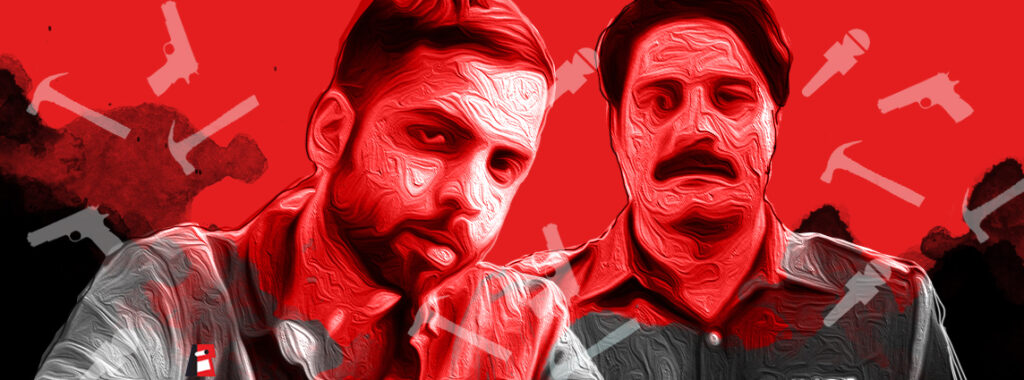Well-crafted and executed with impeccable precision, the grisly drama creates an enchantingly deadly cocktail of caste, politics and perverse personal emotions to expose the underbelly of north India
“The problem is not that there is evil in the world. The problem is that there is good. Because otherwise, who would care?” asks VM Varga, the vicious, ruthless Russian antagonist, in Fargo Season 3. Paatal Lok, created by Sudip Sharma and currently streaming on Amazon Prime, will nod in agreement.
In the dark noir drama — which has an ensemble cast of Jaideep Ahlawat, Gul Panag, Bengali actor Swastika Mukherjee and Neeraj Kabi, and more — the problem is that there is good and there are people who seemingly try to do good to society — anti-caste movements, liberals, cops — but they are forced to cohabit worlds of darkness and evil and in the process, they become the evil or lines between good, bad and the ugly get so blurred that you, the viewer, enter a realm of happy intoxication and start imagining the right as wrong and, at times, the wrong as right.
The case
This confusion is life eponymous. And that’s exactly what Sudip Sharma and team seem to have figured out while creating and writing Paatal Lok, which follows the life and career of a seemingly good-for-nothing Delhi cop and his tribulations. Hathi Ram Chaudhary (Jaideep Ahlawat) is a man haunted by the past, the present and the future. He carries deep but dormant scars; has failed to make peace with them and ends up a failure in getting it repeated in his own life. Still, he is not a bad man or a bad cop. He is duty-bound and shows courage, resilience and integrity in pursuing the high-profile case that comes his way, at a time he has given up on ambitions in life.
But the case takes him places, literally and not figuratively. The case, an alleged assassination attempt on a prominent media personality in Delhi, gets murkier by the day and a complex web of events starts forming around it, attracting into it a march of characters only the north of India can produce. Obviously, like the four accused persons, Hathi Ram also gets caught in the fulcrum and it gets dangerously late when he realises it’s too late to return. There is a lot at stake already and death or infamy would be a much lesser price for what he has found.
Five distinct features make Paatal Lok, arguably, the finest crime series India has ever produced.
First, this is one of the best-written series from India. Scenes are well-crafted, well begun and well ended. Characters speak minimally and optimally. Not every scene is loaded with punch lines for public applause, still wherever one is delivered the impact is telling (“Delhi, You’re so fucking predictable!”). Scenes are not getting verbose and the writing has managed to maintain the tempo intact throughout the nine episodes.
Caste, drugs and violence
Next, Paatal Lok knows the geographies its characters represent and does not shy away from addressing the raw, real concerns that loom over these landscapes. So it delves into caste politics, drug abuse, gender violence, queer issues, corruption in politics and media, dysfunctional families, perverse pleasures of pelf and power, betrayal, Kafkaesque metamorphosis of individuals who once championed ethical values, sex’s hide-and-seek with ambition, the anxieties and trauma of minorities (“I didn’t raise my son even as a Muslim, but you people have made them a Jihadi,” laments a father), the rise and rise of the rightwing, and the disturbingly scented world of adultery and its metaphysical manifestations. When the land starts speaking through its people, it pulls out all stops.
Third, Paatal Lok’s camera work is a masterclass. Often you don’t notice the camera at all and when it makes its presence felt, through the aerial point of view shots and deeply engaging portrait shots inside bars and houses, it adds layers of meaning to it. The cinematography is done by Avinash Arun and Saurabh Goswami. Avinash, who is also the director of the nine episodes, along with Prosit Roy, is known for his national award-winning film, Killa. Saurabh is known for the Netflix series, Selection Day.
Fourth, this series marks a clear shift in Indian web content’s recent and short history. Take the predecessors of Paatal Lok, such as The Bard of Blood (Netflix, starring Imran Hashmi and Jaideep Ahlawat), Inside Edge, created by Karan Anshuman in 2017 whose Mirzapur (2018) was a treat for viewers, or the many other short and long projects being released on several other OTT (streaming) platforms, all have been unfinished business. Granted, some showed sparkling moments here and there, but they lacked the holistic aesthetic perfection and brilliance of Paatal Lok, which has been produced by actor Anushka Sharma’s Clean Slate Films.
You’re trapped
Finally, Paatal Lok’s depiction of the system is splendidly realistic. It treats people as mere pawns in the ugly grand narrative of the system, which, as a top cop explains towards the end of the show, is a well-oiled one though for an outsider it looks all messy and rotten. People are just the cogs and a rebelling cog can easily get replaced. Rebellion as a bargaining chip might work in the rat race for power and control but when it takes the form of truth-seeking it becomes a tryst with the Paatal Lok (The Netherworld) and the creatures that come out to haunt you are not a great sight to watch. To tweak Shakespeare a bit, “As flies to wanton boys are we to the gods (read the system); they kill us for their sport.”
Paatal Lok makes the sport bewitching and beguiling. You’re trapped.

